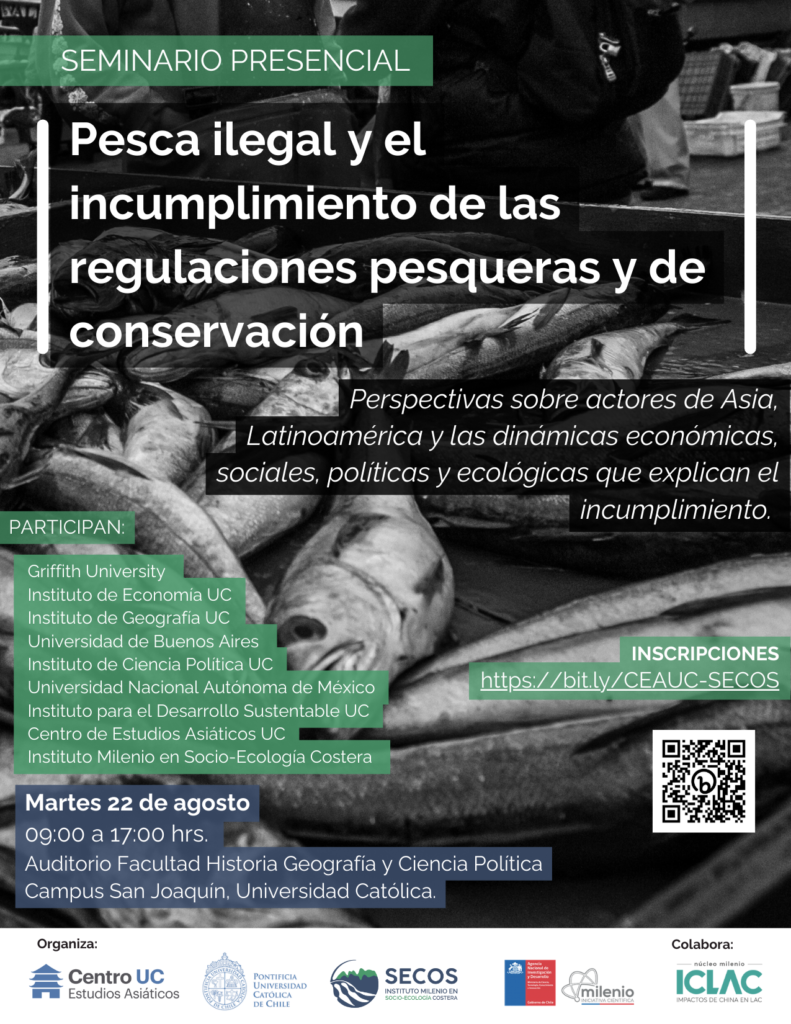09 Aug International seminar will address illegal fishing and non-compliance with fisheries regulations in Asia and Latin America
Posted at 18:26h
in News
The event is organized by the UC Center for Asian Studies (CEA UC) and the Millennium Institute for Coastal Socio-Ecology (SECOS), in collaboration with the Millennium Nucleus on the Impacts of China in Latin America and the Caribbean (ICLAC), and will take place on August 22 in person. The session will present the perspectives of the various stakeholders involved, as well as the economic, social, political, and ecological dynamics that explain this phenomenon.
Illegal fishing and non-compliance with fisheries and conservation regulations pose multiple challenges to the sustainability of natural resources and food security, with undeniable consequences for the social cohesion of affected communities and relations between states. As such, it constitutes an issue of international magnitude due to its environmental impacts—primarily related to biodiversity loss—as well as its economic and humanitarian consequences, particularly affecting developing countries.
According to estimates, illegal fishing accounts for around 20% of global fish catches, with Asia and Africa being the most affected regions. In these areas, illegal fishing results in substantial economic losses and threatens the livelihoods and food security of fishing communities, as well as those who depend on marine products for their diet.
On the Pacific coast of South America, there is widespread non-compliance with fisheries regulations, ranging from small-scale fisheries to international fleets. One emblematic case occurred in 2020 within a marine protected area in Ecuador’s Galápagos Islands, where over 300 vessels flying the Chinese flag were detected fishing illegally while operating without their location systems. This incident sparked tensions between the two countries.
In Chile, a study conducted by researchers from the Millennium Institute for Coastal Socio-Ecology (SECOS) revealed that 83% of fishing associations report being affected by illegal fishing within their management areas, with the loco (Concholepas concholepas) being the main resource illegally harvested in these zones.
In this context, the UC Center for Asian Studies (CEA UC) and the Millennium Institute for Coastal Socio-Ecology (SECOS), with support from the Millennium Nucleus on the Impacts of China in Latin America and the Caribbean (ICLAC), will hold an international seminar aimed at addressing illegal fishing and non-compliance in all its complexity and from an interdisciplinary perspective, with a focus on Latin America and the Asia-Pacific regions.
The event will take place in person on Tuesday, August 22, in the auditorium of the Faculty of History, Geography, and Political Science at the San Joaquín Campus of the Pontificia Universidad Católica de Chile. It will explore various factors and circumstances that hinder compliance with fisheries and conservation regulations.
“Despite being a highly relevant issue, illegal fishing is rarely addressed. With this seminar, we aim to raise awareness and foster discussion from an interdisciplinary perspective, which is key to comprehensively tackling such a complex matter,” says Nicole Jenne, Director of CEA UC and faculty member at the Institute of Political Science of the Pontificia Universidad Católica de Chile.
Stefan Gelcich, professor at the UC Faculty of Biological Sciences and director of the Millennium Institute for Coastal Socio-Ecology (SECOS), explains that “non-compliance with regulations undermines the sustainability of both small- and large-scale fisheries throughout the entire value chain. This seminar will explore different conceptual frameworks and methodological approaches to understand the heterogeneity of illegal fishing and, in doing so, to consider innovative solutions.”
The event will also highlight practices and policies that support compliance with both national and international regulations, as well as international cooperation to achieve this goal. “Solving this dilemma requires advancing the governance of the high seas on a global scale, along with a commons-based understanding of the ocean, managed through multilateral agreements, clear rules, and, above all, a system of mutual monitoring and oversight. Today’s technological capabilities offer a real opportunity to create such a multilateral, decentralized, and collaborative mechanism,” concludes Johannes Rehner, director of UC Geography and researcher at the UC Center for Asian Studies.
Thus, the seminar — featuring presentations from Griffith University, the National Autonomous University of Mexico (UNAM), the University of Buenos Aires, Universidad Mayor, and the Pontifical Catholic University of Chile — will address this complex issue, which persists due to, among other factors, the food needs of a growing global population, fishing subsidies that encourage extraction, and a lack of effective regulation.
—
Seminar: Illegal Fishing and Non-Compliance with Fisheries and Conservation Regulations: Perspectives on Asian and Latin American Actors and the Economic, Social, Political, and Ecological Dynamics that Explain Non-Compliance.
Martes 22 de agosto, 09:00 a 17:00 hrs.
Auditorio de la Facultad Historia, Geografía y Ciencia Política, campus San Joaquín
Inscripción aquí
Revisa el programa aquí



